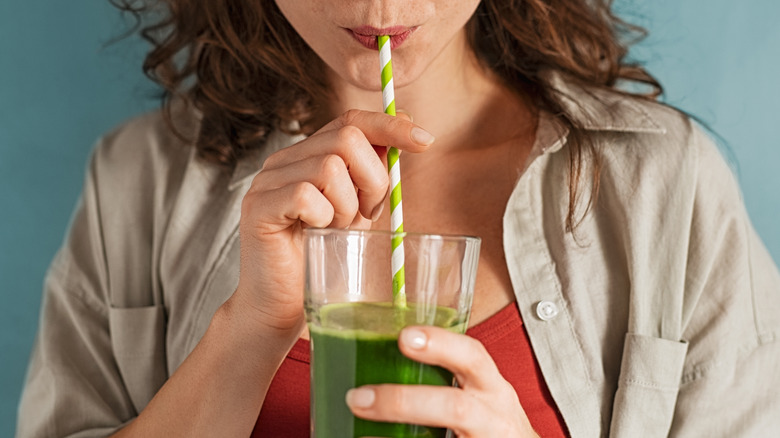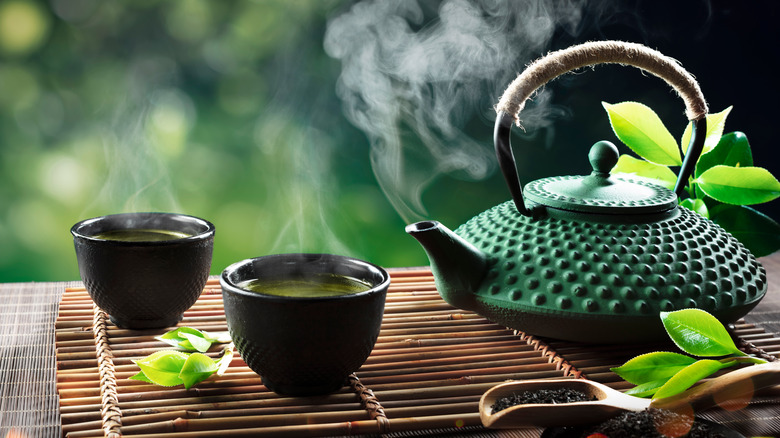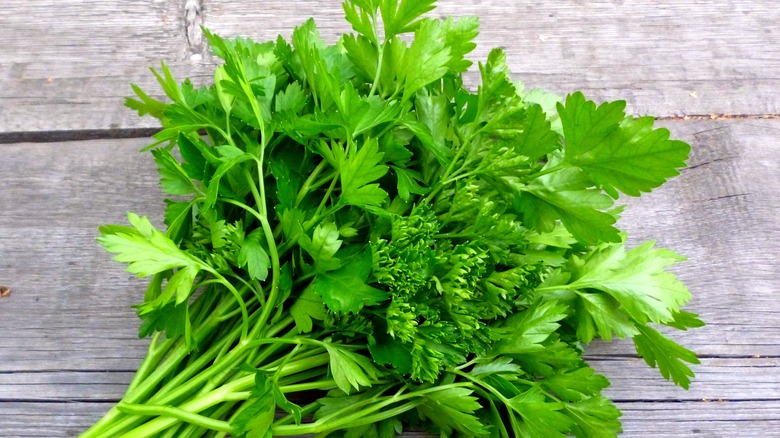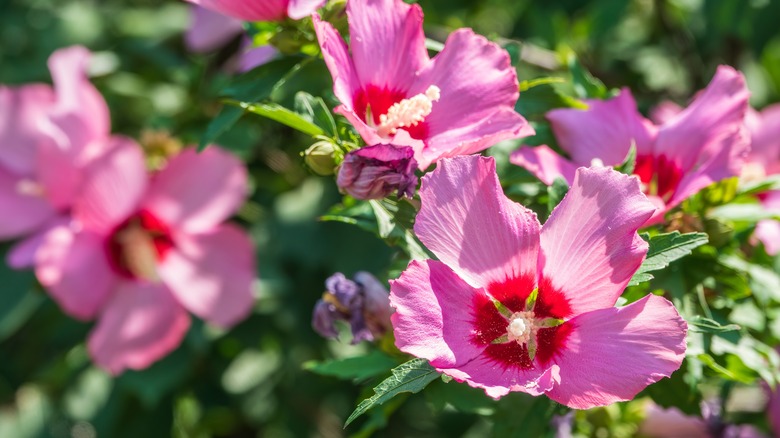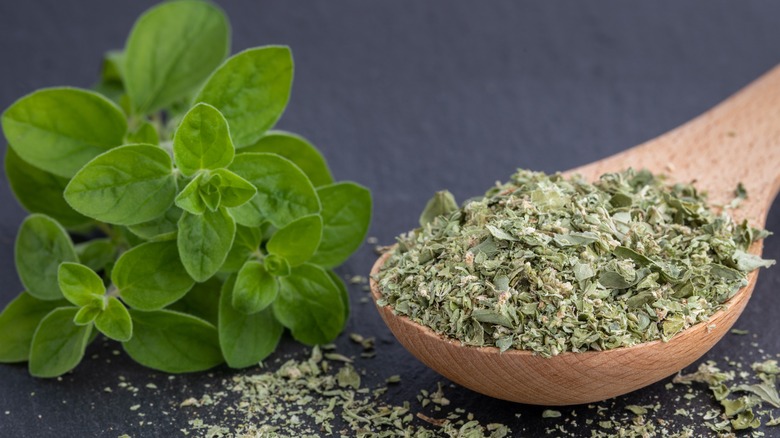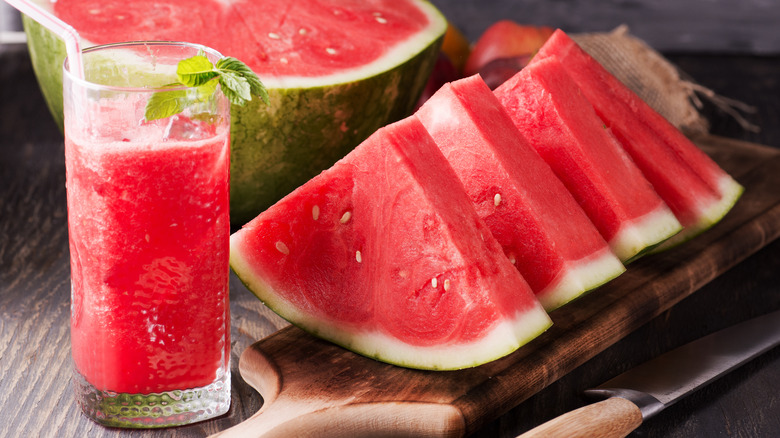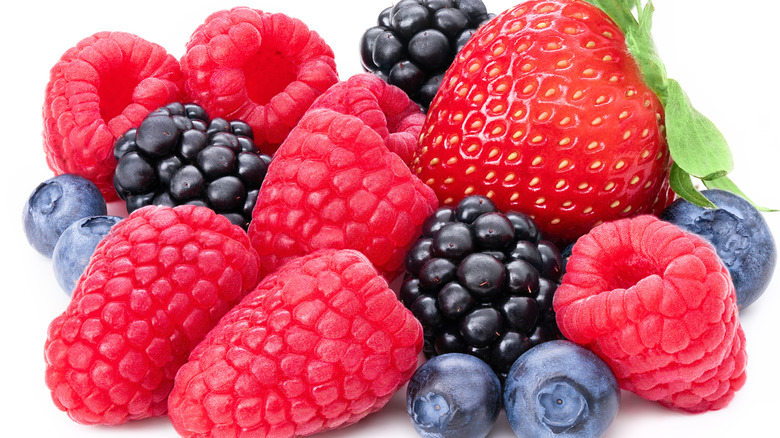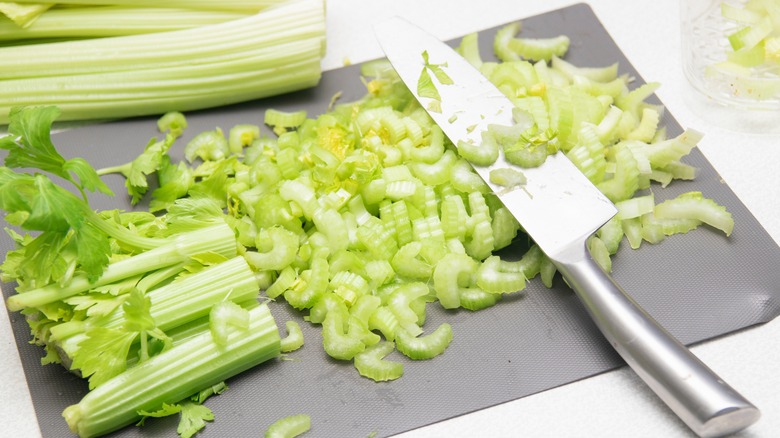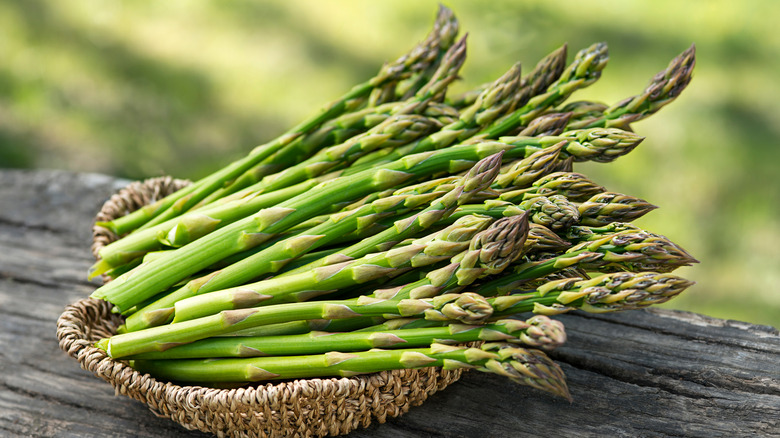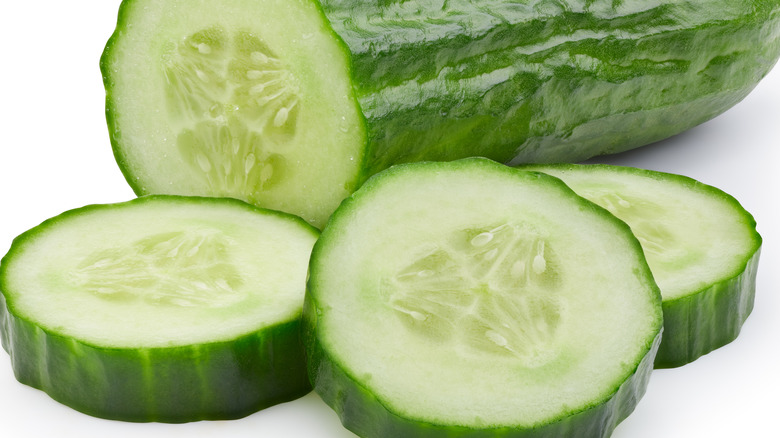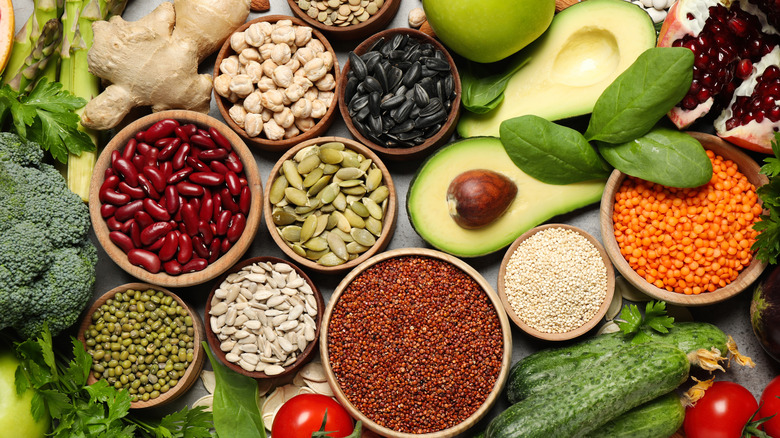10 Foods And Drinks That Are Natural Diuretics
Diuretics are substances that help you secrete water (via the Mayo Clinic). This is sometimes necessary when experiencing water retention. Also known as edema, water retention has many causes.
Healthline says that water retention can be the result of improper hydration, such as consuming too much sodium (salt). Sodium is the most abundant electrolyte in the body (via the Cleveland Clinic), and it plays a crucial role in hydration: Your body needs to maintain a specific ratio of sodium to water, so when too much sodium is ingested, your body needs to hang onto extra water to keep your fluids balanced. Apart from improper hydration, water retention can also be caused by other factors, such as sitting or standing in the same position for too long, premenstrual syndrome, pregnancy, certain medications, or certain health conditions. When experiencing water retention, you may notice swelling in some parts of the body, such as the legs, feet, stomach area, or face. Additionally, Healthline lists weight fluctuations and stiff joints as other symptoms of water retention.
While some medications are diuretics, there are also many natural substances — i.e., foods and drinks — that can have a diuretic effect. As the Mayo Clinic explains, these substances may cause you to urinate more frequently, thus relieving you of excess water. However, even natural substances like herbs may interact with other medications you're already taking. As such, the Mayo Clinic recommends speaking with your doctor before trying any new herbal remedies.
Natural diuretics can be used to treat a variety of disorders
The Mayo Clinic says water retention or edema can be caused by a wide variety of conditions or medications. For instance, high blood pressure medications, diabetes medications, steroid drugs, estrogens, or even over-the-counter nonsteroidal anti-inflammatory drugs (NSAIDs) such as ibuprofen can cause or worsen edema. Additionally, health conditions including congestive heart failure, liver damage, and kidney disease can all cause edema. In extreme cases, your doctor or healthcare provider may prescribe diuretic drugs or "water pills," but there's another treatment option that doesn't require a prescription: natural diuretics.
According to a review article from the World Journal of Pharmacy and Pharmaceutical Sciences, there are many scientific studies suggesting various traditional herbal remedies can have a noticeable diuretic effect. In some cases, such remedies may be preferable to prescription drugs, as these drugs tend to have a long list of potential side effects. As the authors of this review explain, diuretic drugs are "not designed to work with the way that the body naturally functions." By contrast, natural diuretics have been used for thousands of years, have few unwanted side effects, and may even provide additional health benefits. The authors point to research demonstrating that such substances have been shown to significantly relieve water retention (as compared to a placebo).
Natural diuretics can help prevent kidney stones
Many of the substances that are considered natural diuretics are commonly found in a healthy diet. For instance, a review from the International Journal of Molecular Sciences lists green tea, parsley, oregano, pomegranate, and raspberry as well-established natural diuretics (in addition to some lesser-known herbs).
The authors of the review suggest consuming natural diuretics as part of a healthy diet can help to prevent kidney stones, or urolithiasis. They mention the well-established correlation between reduced risk of developing kidney stones and diets with a high intake of fruits and vegetables. Part of this effect may be that diets high in fruits and vegetables are likely to include a variety of natural diuretics in moderation. As such, natural diuretics may be of particular interest to those who are at greater risk of developing kidney stones, such as people who have already had the condition in the past or those with digestive diseases (via the Mayo Clinic).
The review also lists some phytochemicals (plant compounds) that have been shown to help prevent urolithiasis, such as catechin, quercetin, diosmin, rutin, and curcumin. Each of these compounds is found in a variety of fruits, vegetables, and herbs.
Dandelion
One of the most well-established natural diuretics is dandelion, specifically dandelion greens. A review article from the World Journal of Pharmacy and Pharmaceutical Sciences discusses a study of 28 women who experienced a significant increase in urine after consuming liquid dandelion leaf extract. Another study from the Journal of Ethnopharmacology describes the many health benefits of this plant, one of which is its mild diuretic effect.
Dandelion greens can be added to salad. However, the raw greens of the dandelion plant have a taste that many consider to be bitter (via the World Journal of Pharmacy and Pharmaceutical Sciences). For those who find the taste bitter, cooking the greens tends to make them less bitter. The review article suggests sauteeing the greens, adding them to soup, or boiling the leaves to make a tea.
For those who don't enjoy the taste in any form, there are also many pills and capsules containing dandelion leaf extract. If you'd like to experience the health benefits of dandelion greens but prefer not to eat them, consider speaking with your healthcare provider about the potential benefits of taking a dandelion leaf extract supplement.
Green and black tea
Another well-known natural diuretic is tea, specifically green or black tea. A review from the International Journal of Molecular Sciences lists many natural diuretics, among them green tea and black tea. As the authors explain, both types of tea contain numerous phytochemicals known to have a diuretic effect. For instance, green tea is high in catechins and epicatechins. Several rodent studies have demonstrated the ability of green tea to prevent the development of kidney stones (a condition requiring the use of diuretics), and they attribute this effect to the presence of catechins and epicatechins. Another study from Advances in Health Science Research found high doses of the aqueous extract of green tea leaves (AEGTL) could have a similar diuretic effect to that of furosemide, a strong diuretic drug.
Similarly, the authors of the review from the International Journal of Molecular Sciences list black tea as a natural source of rutin, another phytochemical known to help prevent kidney stones and reduce the need for diuretics. Another study from Pharmacognosy Magazine that tested the effects of black tea against the effects of furosemide in rats found that black tea had a mild diuretic effect.
Both black and green tea are popular beverages hot or iced, but the extracts of both types of tea can also be found in pills or capsules, or as an additive to other health drinks.
Parsley
Parsley, a common culinary herb, has an established diuretic effect. A study from the Journal of Ethnopharmacology tested the effects of drinking an aqueous parsley seed extract against the effects of drinking water in rats, and the researchers found that the rats who drank the aqueous parsley extract eliminated significantly more fluid within 24 hours of consumption than the rats who drank only water. The researchers noted that the diuretic effect of parsley was not apparent in the absence of potassium, suggesting the diuretic effects of parsley are in part mediated through an increase of potassium retention.
As a culinary herb, dried parsley leaves are frequently added to a variety of dishes. The fresh herb is also sometimes served as an edible garnish alongside restaurant meals. Additionally, parsley leaves can be made into a tea, with a taste that many describe as earthy. Parsley extract can also be found in pills or capsules.
Hibiscus
Hibiscus is a flower commonly consumed as a tea. A study from the Journal of Ethnopharmacology says hibiscus acts as a natural diuretic in part by causing the release of nitric oxide, increasing kidney filtration. The authors attribute this effect to quercetin, a phytochemical known to have a diuretic effect. A review from the International Journal of Molecular Sciences lists quercetin as a phytochemical that has a diuretic effect and can help to prevent kidney stones.
Hibiscus tea generally has a sweet and mild flavor, but like other natural diuretics, hibiscus extract can also be found in pills and capsules. Additionally, you may be able to find it in powdered form, which can be mixed with water and used to make tea. And like other natural diuretics, hibiscus has other known health benefits. The Cleveland Clinic says hibiscus is anti-inflammatory and antibacterial, as well as high in antioxidants (including quercetin). Plus, it can also lower blood pressure and cholesterol.
Oregano
In addition to parsley, another popular culinary herb, oregano, is also considered to have a diuretic effect.
According to Healthline, oregano is often used to treat bloating and edema. A review from the International Journal of Molecular Sciences lists oregano as a natural diuretic that has the potential to prevent kidney stones.
While dried oregano is frequently added as an herb to many dishes, oregano can also be consumed as a tea. And as with other natural diuretics, you can also find it in pill or capsule form. As Healthline explains, the tea has a taste that is peppery and may be slightly bitter to some, but it is a popular health beverage in part because it has a wide variety of other benefits. For instance, it may be consumed to help treat a sore throat or cough, nausea, and digestive problems including irritable bowel syndrome (IBS). Additionally, it is known to be high in antioxidants and have anti-inflammatory, antibacterial, and antiviral effects.
Watermelon
The popular summer fruit watermelon is known to have a diuretic effect. A study from Biomedicine and Pharmacology evaluated the effects of watermelon via multiple rat experiments. The authors explain that the results validate the use of watermelon as a natural diuretic and protective agent against kidney stones, specifically watermelon pulp (and not watermelon seed), though further research is needed.
Watermelon is sweet and watery (as the name suggests), and many people enjoy its taste. However, watermelon extract can be found in pill form, like other diuretics. Both watermelon pulp and watermelon seed extract can be found in various pills. Watermelon is also a popular addition to juices and smoothies. As with other natural diuretics, watermelon has many other health benefits apart from its diuretic effects.
Healthline claims watermelon is naturally hydrating (due in part to its high water content), and that it may also have anticancer and anti-inflammatory effects. In addition, some evidence suggests watermelon could improve heart health, relieve sore muscles, and aid skin health.
Berries
In addition to watermelon, berries are another fruit considered to have diuretic properties. A review from the International Journal of Molecular Sciences lists quercetin as a phytochemical with diuretic effects that can also prevent kidney stones, and quercetin is found in all berries (via a study published in the Journal of Agricultural and Food Chemistry). The researchers of the latter study note that the highest concentrations of quercetin were found in bog whortleberry, lingonberry, cranberry, chokeberry, sweet rowan, rowan berry, sea buckthorn berry, and crowberry. Cranberry is worth singling out because of its additional role in preventing urinary tract infections (UTIs): A review from the journal Clinics claims regular cranberry juice consumption may decrease the number of UTIs a person experiences, particularly among those who are prone to develop such infections.
Raspberries, though not listed as one of the berries with the highest concentration of quercetin by researchers (via the Journal of Agricultural and Food Chemistry), are also worth singling out. They are the only berry specifically mentioned in the International Journal of Molecular Sciences review as a natural diuretic and protective agent against kidney stones. An experimental rodent study from the Tropical Journal of Pharmaceutical Research confirms the diuretic effects of raspberry extract in rats, though more research may be needed.
Celery
Fruits and vegetables with a high water content, like celery, can have a hydrating effect — but interestingly, they may also have a diuretic effect.
According to the Cleveland Clinic, celery is considered a natural diuretic. Though more research is needed to establish the diuretic effects of celery and confirm the optimal dose, a study from the Indian Journal of Natural Sciences found celery to have a similar diuretic effect to parsley in rats. In this study, both celery and parsley caused significantly more urination than water, which was used as a control.
Of course, celery has many other health benefits as well. The Cleveland Clinic devotes an entire article to the blood pressure-lowering effects of celery, specifically the entire stalk (and not just the seed). Celery also contains many important antioxidants, reduces inflammation, aids digestion, and can have an alkalizing effect (via Healthline). Celery has a mild flavor, though many people do not enjoy the taste. Celery seed extract can also be consumed in pills or capsules.
Asparagus
Known for tinting urine green, asparagus may also act as a natural diuretic. An experimental rodent study from the West Indian Medical Journal showed asparagus had a diuretic effect in rats. The Cleveland Clinic also lists asparagus as a natural diuretic. However, more research is needed to establish this effect.
In addition to potentially acting as a diuretic, asparagus has many other health benefits. Healthline suggests asparagus can lower blood pressure, aid digestion, and support a healthy pregnancy. And like the other natural diuretics listed here, it also has many micronutrients and antioxidants.
Asparagus is relatively easy to add to your diet. It has a savory flavor that many people enjoy, and it's easy to prepare or cook. It can be boiled, grilled, steamed, roasted, sauteed, or even eaten raw. Though it's grown in the spring and summer months, it can also be purchased frozen all year long, making it easy to add to a variety of dishes.
Cucumbers
In the category of fruits and vegetables with a high water content, cucumbers may also be another natural diuretic. While more research is needed on the diuretic effects of cucumber, the Cleveland Clinic lists cucumber as a natural diuretic. Cucumber juice has also been shown to reduce blood pressure, according to a study published in the journal Public Health Indonesia.
Healthline lists many health benefits of cucumber water. It can keep you hydrated, lower your blood pressure, support skin and bone health, act as an anti-cancer agent, and deliver plenty of antioxidants. Technically a fruit, cucumber has a mild, refreshing flavor that is often enjoyed raw (though cucumbers can also be cooked). Many people enjoy drinking cucumber water, which is very easy to make: Simply add sliced cucumber to water. Using a diffuser to keep the cucumber in place can prevent the slices of cucumber from hitting your lips each time you take a sip of the water, but it isn't necessary. You can also eat the slices of cucumber when you finish the water (or whenever you decide to remove them).
Too much of a natural diuretic could cause electrolyte imbalance
While natural diuretics can provide numerous health benefits when consumed in moderation, registered dietitian Julia Zumpano of the Cleveland Clinic recommends using them with caution, especially when taking them in concentrated pill form.
Though many of the above natural diuretics are available as pills or capsules, such supplements aren't regulated by the FDA, and little research is available that actually determines the optimal dose of these substances. Zumpano recommends avoiding these supplements if your need for diuretics is not disease-based or medication-based. At the very least, you'll want to speak with your healthcare provider before taking any such supplements, in part because herbal supplements can interact with medications you may already be taking. Consuming these natural diuretics in their natural form, as food or drinks, is generally preferable, especially among those who don't have an urgent need to take diuretics.
Even with foods and drinks, though, it's still important not to overdo it. As Zumpano explains, taking too much of any diuretic (natural or otherwise) could cause electrolyte imbalance by causing your body to excrete too much water. So eat and drink these natural diuretics in moderation, alongside other healthy foods. And make sure to drink plenty of water when adding natural diuretics to your diet.
A healthy, balanced diet includes natural diuretics in moderation
A healthy, balanced diet includes some natural diuretics in moderation, consumed in their natural form: as food or beverages (via the Cleveland Clinic). The key here is balance. The idea is not to make your entire diet consist entirely of natural diuretics, but to balance out the natural diuretics you do consume with other healthy foods to make sure your body doesn't lose too much fluid. Additionally, drinking plenty of water is not only great for your health, but it can also help to balance out the effects of any natural diuretics you're consuming.
Importantly, some people use diuretics for weight loss, but this isn't recommended and can actually be dangerous (via Healthline). While diuretics can indeed cause weight loss, the weight that's being lost is just water and may cause dehydration. As soon as you rehydrate, that weight will come right back. In other words, diuretics cause weight loss that's temporary and unhealthy, not to be confused with weight loss that happens as the result of healthy changes to your diet and lifestyle. So, as with all things, make sure to consume natural diuretics in moderation, as part of a healthy, balanced diet.

